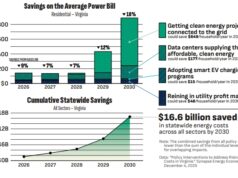by Ivy Main; cross-posted from Power for the People VA
Every year I do a round-up of climate and energy bills at the start of the General Assembly session. This year, as expected, Republicans continue their assault on the hallmark legislation passed in 2020 and 2021 committing Virginia to a zero-carbon economy by 2050. In addition, this year features the usual assortment of bills doing favors for special interests, efforts to help residents and local governments go solar and a brand-new money and power grab by Dominion Energy.
Republicans are not down with the energy transition
Dominion Energy may have baked the transition to renewables into its planning, but unsurprisingly, the Virginia Republican Party thinks the fight to preserve fossil fuel dependence is a winning issue. The three foundational bills of Virginia’s energy transition — the Regional Greenhouse Gas Initiative (RGGI), the Virginia Clean Economy Act (VCEA) and Clean Cars — all come in for attack, either by outright repeal or death-by-a-thousand-cuts.
Senate Bill 1001 (Richard Stuart, R-Westmoreland) would repeal the Clean Energy and Community Flood Preparedness Act, the statute that propelled Virginia into the Regional Greenhouse Gas Initiative (RGGI). Participation in RGGI is the vehicle by which utilities buy allowances to emit carbon pollution. Under RGGI, the number of allowances available declines every year, and Virginia’s power sector would reduce CO2 emissions 30% by 2030. The allowance auctions have already raised hundreds of millions of dollars that by law must be used for low-income energy efficiency programs and flood resilience projects. A similar bill failed last year, and Senate Democrats have pledged to block the effort again. Meanwhile, Gov. Glenn Youngkin is trying to withdraw Virginia from RGGI administratively, a move that former Attorney General Mark Herring ruled wasn’t legal.
Carbon allowance auctions are a foundational piece of the VCEA as well, but it is a much bigger law that touches on too many aspects of energy regulation for repeal of the whole thing. This isn’t stopping Republicans from trying to undermine key provisions. House Bill 2130 (Tony Wilt, R-Rockingham) and Senate Bill 1125 (Travis Hackworth, R-Tazewell) would give the State Corporation Commission more authority over closures of fossil fuel plants and require it to conduct annual reviews aimed at second-guessing the VCEA’s framework for lowering emissions and building renewable energy. Achieving the VCEA’s climate goals is decidedly not the purpose; meanwhile, the legislation would remove business certainty and undercut utility planning.
Other attacks on the VCEA take the form of favors for specific industries, but would effectively make the VCEA’s goal of reaching 100% carbon-free electricity by 2050 at the least cost to consumers impossible. I’ve dealt separately with small modular reactors, hydrogen and coal mine methane below.
In addition, House Bill 1430 and House Bill 1480 (Lee Ware, R-Powhatan) exempt certain industrial customers categorized as “energy-intensive trade-exposed industries” from paying costs that the VCEA makes all customers pay. The exemption would last four years. The result would be nice for those industries but would shift costs onto everyone else. The bill seems likely to pass the House, but the same bill last year died in the Senate. However, Senate Bill 1454 (Jeremy McPike, D-Prince William) proposes the SCC put together a group of experts to study the issue and make recommendations.
In the transportation sector, no fewer than seven bills sought to repeal the Air Pollution Control Board’s authority to implement the Advanced Clean Car Standard: House Bill 1372 (Buddy Fowler, R-Hanover), House Bill 1378 (Wilt), Senate Bill 778 (Stuart), Senate Bill 779 (Stephen Newman, R-Bedford), Senate Bill 781 (Bill DeSteph, R-Virginia Beach), Senate Bill 782 (Bryce Reeves, R-Fredericksburg) and Senate Bill 785 (Ryan McDougle, R-Hanover). The Senate bills were killed in committee on Tuesday. The House bills are likely to pass that Republican-led chamber, but it appears clear that Senate Democrats intend to hang fast to Clean Cars.
Although so many identical bills might look like a failure of legislators to coordinate efforts, in fact the senators all signed on as co-patrons to each other’s bills, along with a dozen House Republicans. Republicans think they have a winning issue for the November election, and lots of them want to claim they filed “the” legislation attempting to repeal Clean Cars.
Raiding the store for polluter interests
If the VCEA is here to stay, there are some decidedly non-green industries that want to claim the green mantle to get in on the action. It’s not about making themselves feel better about their high greenhouse gas emissions. It’s about getting a piece of the market for renewable energy certificates and undermining the integrity of the renewable energy label.
House Bill 1643 (Terry Kilgore, R-Scott) and Senate Bill 1121 (Hackworth) proclaim coal mine methane a renewable energy. House Bill 2178 (James Morefield, R-Tazewell) makes coal mine methane a qualifying industry for Virginia’s green job creation tax credit.
Burning wood for electricity produces as much CO2 as coal, at a cost much higher than solar energy today. Yet House Bill 2026 (Israel O’Quinn, R-Bristol) and Senate Bill 1231 (Lynwood Lewis, D-Accomack) remove the requirement in the VCEA for the retirement of Dominion’s generating facilities that burn wood for electricity and allow these generating plants to qualify as renewable energy sources.
SMRs and hydrogen
Speaking of raiding the store, House Bill 2197 (Kathy Byron, R-Bedford) allows “advanced nuclear technology” to qualify for Virginia’s renewable portfolio standard (RPS). The bill defines the term as “a small modular reactor or other technology for generating nuclear energy,” which looks like an opening for existing nuclear plants as well. Even if it isn’t, treating any kind of nuclear technology as a renewable resource upsets the VCEA’s calibrated approach to nuclear as a zero-carbon technology alongside renewable energy, not in place of it.
House Bill 2311 (Kilgore) goes a step further, declaring both nuclear and hydrogen to be renewable energy sources and making them eligible for the RPS. Hydrogen, of course, is a fuel made from other sources of energy, which can be renewable but are more typically fossil fuels currently. Given Youngkin’s interest in seeing hydrogen made from coal mine methane, you can see where this is headed.
House Bill 2333 (Danny Marshall, R-Danville) calls on the SCC to develop a pilot program to support building small modular nuclear reactors, with a goal of having the first one operational by 2032. In spite of the word “pilot,” the bill is ambitious. It contemplates four sites, each of which can have multiple reactors of up to 400 megawatts each.
Utility reform
Some of these bills are reform bills; some are “reform” bills. To recognize the difference, it helps to know whether the proponent is a public interest organization or the utility itself. When Dominion tells you it has a bill you’re going to love, you can be pretty sure the result will be bad for ratepayers.
Senate Bill 1321 (Jennifer McClellan, D-Richmond, and Creigh Deeds, D-Charlottesville) and House Bill 1604 (Ware), billed as the Affordable Energy Act, is real reform legislation that gives the SCC authority to lower a utility’s base rates if it determines that existing rates produce “unreasonable revenues in excess of the utility’s authorized rate of return.”
Other straightforward measures include House Bill 2267 (Wilt) and Senate Bill 1417 (David Suetterlein, R-Roanoke), which allow the SCC to decide to add the cost of a new utility generation project into base rates instead of granting a rate adjustment clause (RAC), and House Bill 1670 (Marshall), which returns rate reviews to every two years instead of the current three years.
Dominion, however, has its own “reform” bill, introduced by its favorite Democratic Senate and Republican House leaders. As is typical for Dominion, Senate Bill 1265 (Dick Saslaw, D-Fairfax) and House Bill 1770 (Kilgore) is long, dense and deadly effective in crushing competition and protecting profits. The bitter pill is sugarcoated with short-term rebates and concessions to minor reform proposals, such as biennial rate reviews in place of triennial reviews and consolidating many RACs into base rates. A somewhat less objectionable substitute moved forward in Senate subcommittee this week, but further negotiations are expected to produce yet more changes.
The warring factions may be able to find common ground in House Bill 2275 (Kilgore) and Senate Bill 1166 (Scott Surovell, D-Fairfax), legislation creating a structure for state energy planning.
House Bill 1777 (O’Quinn) and Senate Bill 1075 (Frank Ruff, R-Mecklenburg) change how the SCC regulates rates of Appalachian Power – but not Dominion. They require the SCC to conduct “annual rate true-up reviews (ART reviews) of the rates, terms and conditions for generation and distribution services” by March 31, 2025 and annually after. They also remove the requirement for an integrated resource plan.
Retail choice
Past years have seen efforts to restore the ability of customers to buy renewable energy from providers other than their own utilities, an important option for a resident or business that wants to buy renewable energy at a competitive rate. Senate Bill 1419 (Suetterlein) marks at least the fourth year in a row for this effort. A Senate subcommittee voted against it this week.
Dominion’s “reform” bill, on the other hand, clamps down further on retail choice. In light of Youngkin’s support for retail choice in his energy plan, it is interesting to see Republicans like Kilgore instead enabling Dominion’s anticompetitive efforts.
Goosing investments in solar and efficiency
With the passage of the federal Inflation Reduction Act last summer, renewable energy and energy efficiency tax credits are more generous and easier to access than ever before. Senate Bill 848 (Barbara Favola, D-Arlington) and House Bill 1852 (Suhas Subramanyam, D-Loudoun) direct the Commission on School Construction and Modernization to figure out how to help schools take full advantage of onsite solar.
House Joint Resolution 545 (Briana Sewell, D-Prince William) directs the Department of Energy to study barriers to clean energy investments by localities and their residents and issue recommendations to help.
Senate Bill 1333 (Ghazala Hashmi, D-Richmond) creates a program within the Department of Energy to be known as the Commonwealth Solar and Economic Development Program. The program will implement solar, energy efficiency and other economic development projects in specified census tracts.
Senate Bill 1323 (McClellan) requires the SCC to establish for Dominion Energy Virginia annual energy efficiency savings targets for customers who are low-income, elderly, disabled or veterans of military service.
Senate Bill 984 (Monty Mason, D-Williamsburg) clarifies that lease arrangements for onsite solar are legal, whether or not they’re net metered, including when battery storage is part of the project. (For context: Leasing has always been an option for onsite solar, but the IRA has increased interest in this approach. It is considered especially attractive for residential projects that, except when the customer is low-income, are barred by Virginia law from using third-party power purchase agreements.) The bill also ensures owners can be paid for grid services using the facilities. Another welcome provision of the bill is removing standby charges for residential customers who have batteries along with their solar panels. Currently, residents with systems over 15 kW must pay hefty standby charges.
House Joint Resolution 487 (Marshall) directs the Department of Transportation to study the idea of putting solar panels in highway medians.
Meanwhile, House Bill 2355 (Jackie Glass, D-Norfolk) is a consumer-protection effort for buyers of rooftop solar and other small arrays, who have sometimes been the victims of unscrupulous companies that overcharge and under-deliver.
Shared solar
Virginia has been wading into community solar like a child at the seashore, dipping a toe in and then running away again and again, without ever truly entering the water. A 2020 law establishing a “shared solar” program in Dominion territory was supposed to get us swimming. At the SCC, however, Dominion won the right to impose such a high minimum bill as to make the program unworkable for any but low-income customers, who are exempt from the minimum bill.
Senate Bill 1266 (Surovell) attempts to address the problems with the shared solar program in Dominion territory. Surovell was the author of the 2020 law and criticized the SCC’s action for making shared solar unavailable to anyone other than low-income residents. His approach would limit the minimum bill to more than twice the basic customer charge, while also increasing the size of the program to at least 10% of the utility’s peak load and allowing non-jurisdictional customers like local governments to participate.
Senate Bill 1083 (Edwards and Surovell) creates a shared solar program in Appalachian Power territory. It builds on the framework of the existing program in Dominion territory, but the minimum bill is limited to $20. It also seeks to prevent the interconnection problems that industry members have complained about by limiting costs and requirements to those “consistent with generally accepted industry practices in markets with significant penetration levels of distributed generation.”
On the House side, House Bill 1853 (Suhas Subramanyam, D-Loudoun) combines both Senate bills into one bill that addresses both Dominion and Appalachian Power. For both, it limits the minimum bill to two times the basic customer charge, and it includes the interconnection language.
Offshore wind
Senate Bill 1441 (Mamie Locke, D-Hampton) moves up the VCEA’s deadline for offshore wind farm construction from 2034 to 2024, a change I don’t understand at all, given that the current timeline calls for completion of the Coastal Virginia Offshore Wind Project (CVOW) in 2026. The bill also requires that when Dominion seeks cost recovery, the SCC must give preference “for generating facilities utilizing energy derived from offshore wind that maximize economic benefits to the Commonwealth, such as benefits arising from the construction and operation of such facilities and the manufacture of wind turbine generator components.” I look forward to learning what’s behind that, too.
Senate Bill 1854 (Subramanyam) seeks annual reports from the SCC on the progress of CVOW, including “the status and the anticipated environmental impacts and benefits of such projects” that “analyze the current and projected capital costs and consumer rate impacts associated with such projects.” It also wants “an analysis of the ownership structure chosen by an electric utility for previously approved wind energy projects and the costs, benefits, and risks for consumers associated with utility-owned and third-party-owned projects.” This analysis would compare the Virginia project with other U.S. projects, potentially a useful analytical tool for the next offshore wind project that comes along.
House Bill 1797 (Nick Freitas, R-Culpeper) declares that ratepayers will be held harmless if CVOW’s annual net capacity factor falls below 42% as measured on a three-year rolling average. The capacity factor is the average output of the wind turbines as a percentage of their full potential. In its filing with the SCC, Dominion projected CVOW would hit that 42% mark. If wind speeds turn out to be stronger than projected, the turbines will produce more energy at a lower cost. If the wind (or the machinery) doesn’t meet expectations, the capacity factor will be lower and costs will be higher. The bill would make Dominion absorb the loss in that event. However, the SCC did just resolve this issue in a way that takes account of both ratepayer interests and the newness of the technology, making it unlikely that many legislators will want to revisit this topic.
Senate Bill 1477 (Lewis) allows Dominion, subject to SCC approval, to create an affiliated company to build some or all of its offshore wind project, with the purpose of having the affiliate secure equity financing.
Residential PACE
Senate Bill 949 (Petersen) makes homeowners eligible for property-assessed clean energy (PACE) programs, which provide low-cost financing for energy efficiency and renewable energy upgrades. Currently PACE loans are only available to commercial customers.
Data centers
Virginia has a data center problem. Northern Virginia hosts the largest concentration of data centers in the world, and the energy they consume now amounts to 21% of Dominion’s load. This growth has happened with no state oversight; indeed, it’s been goosed by a billion dollars’ worth of state tax incentives over the past decade. Meeting the energy demand of data centers requires more generation and more transmission lines, usually paid for by all utility customers.
Senate Joint Resolution 240 (Chap Petersen, D-Fairfax), and House Joint Resolution 522 (Danica Roem, D-Manassas) task the Department of Energy with studying data centers’ impact on Virginia’s environment, energy supply, electricity rates and ability to meet climate targets. The bills also ask for recommendations on whether tax incentives should be conditioned on use of renewable energy or on meeting siting criteria.
Both Roem and Petersen also have bills that deal with specific siting issues, mostly unrelated to energy. Senate Bill 1078 (Petersen) limits areas where data centers can be sited (e.g., not near parks and battlefields, a barb likely aimed at the Prince William Gateway project). However, it also requires localities to conduct site assessments for impacts on carbon emissions as well as water resources and agriculture.
Return of the gas ban ban
Last year the natural gas industry tried to get a law passed to ban localities from prohibiting gas connections in new buildings. Some cities in other states have done that to protect the health and safety of residents and protect the climate; meanwhile, about 20 red states have passed laws to prevent their local governments from doing it. But no Virginia locality has attempted to ban gas connections, in part because as a Dillon Rule state, our local governments don’t appear to have that authority. That isn’t stopping the gas industry from seeking to ban bans here; House Bill 1783 (O’Quinn) and Senate Bill 1485 (Morrissey) would do just that. Obnoxiously, it calls the right to use gas “energy justice,” which is surely the best reason to oppose it.
A version of this article appeared in the Virginia Mercury on January 18, 2023.
Update January 19: Two new bills have been added since yesterday. Senator Morrissey filed SB1485 (gas ban ban), and Senator Lewis filed SB1477 (Dominion offshore wind affiliate).















